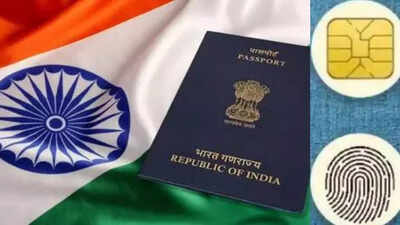What is Indian ePassport & is it mandatory for current passport holders to replace theirs with a new chip-based one?

NEW DELHI: The Government of India has introduced the ePassport which is a combined paper and electronic passport featuring an embedded RFID chip and antenna. The chip securely stores the passport holder’s personal and biometric data and is visually identified by a small gold-coloured symbol on the front cover.With this rollout, India joins over 120 countries, including the United States, Canada, France, Japan, and Australia, in issuing biometric e-passports. This move aligns India with ICAO international standards and represents a major step forward in enhancing national security and streamlining cross-border travel.As global travel rebounds and border security becomes ever more critical, the ePassport equips Indian travellers with a safer, smoother experience abroad. By adopting biometric technology, India underscores its commitment to digital innovation and positions itself at the forefront of modern identity management.
Key benefits of ePassport
- Enhanced Data Security: The ePassport stores information both in printed form and as a digitally signed electronic chip. Immigration officials worldwide can authenticate this data, reducing the risk of forgery and fraudulent passports.
- Robust Encryption: Protected by Public Key Infrastructure (PKI), the ePassport’s chip ensures the integrity and origin of personal and biometric data.
- International Standards Compliance: Following ICAO Document 9303 guidelines, the ePassport uses:
- Basic Access Control (BAC): Restricts chip access to authorised scanning devices.
- Passive Authentication (PA): Verifies stored data and detects tampering.
- Extended Access Control (EAC): Adds an extra security layer for sensitive biometric information like fingerprints.
- Streamlined Immigration: Biometric verification via ePassport allows automated and contactless checks at border control, significantly lowering wait times and easing the travel experience.
- Global Compatibility: As ePassports meet ICAO specifications, they are accepted at checkpoints in most countries, simplifying international travel.
- Fraud Prevention: Advanced security features make it difficult to tamper with or duplicate passports, deterring counterfeiters and protecting individual identities.
- Traveler Convenience: Automated e-gates at airports enable ePassport holders to pass through immigration faster without manual inspections.
- National Security: Including biometric data in passports strengthens border control by more accurately tracking cross-border movement and preventing identity theft.
- Simplified Updates: Electronic storage makes renewing or updating personal details more efficient, speeding up the application process.
- Digital Transformation: The ePassport supports India’s move toward paperless travel and digital identities, paving the way for future innovations in global mobility.
Is replacement mandatory for current Passport holders?
No, existing passports issued by the Government of India remain valid until their official expiry date. ePassports will be issued gradually as each Passport Office becomes technically equipped. This phased rollout across all Passport Offices in India may take a few months. Until then, holders of regular passports do not need to replace them.




